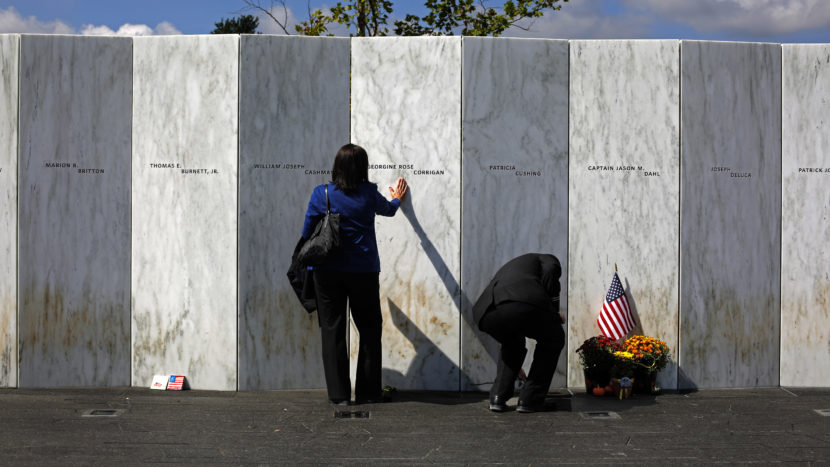
President Obama made good today on earlier threats by vetoing legislation passed unanimously by the House and Senate. The rejected bill would waive sovereign immunity protections for Saudi Arabia and allow victims of the Sept. 11 attacks or their relatives to sue the Saudi government for allegedly helping at least some of the 19 hijackers who carried out those attacks. Fifteen of the attackers were Saudi nationals.
The veto, the 12th of Obama’s presidency, sets the stage for likely showdown votes next week in both the House and Senate. If two-thirds majorities of each chamber vote to override the president’s veto, it will be the first time that’s happened during Obama’s nearly eight years in office.
It’s a strange turn of events for a president who is widely seen by congressional Republicans as an unreliable ally of Saudi Arabia — and for a GOP-led Congress that is more typically a dependable supporter of that kingdom.
This time Obama is siding with the Saudis, who vehemently oppose the Justice Against Sponsors of Terrorism Act, or JASTA. The Saudis have threatened to dump hundreds of billions of dollars in U.S. assets that could possibly be frozen by any American judge hearing a lawsuit. Lawmakers from both parties have chosen the interests of the Sept. 11 families seeking justice over those of the House of Saud.
In a three-page statement that accompanied the veto, Obama spelled out his reasons for seemingly defying the wishes of the grieving families. JASTA, he wrote, “would be detrimental to U.S. interests.” It would neither protect Americans from terrorist attacks nor make the U.S. response to such attacks any more effective.
He said it would take the official response to any foreign government supporting terrorism “out of the hands of national security and foreign policy professionals” and instead place it in the hands of private litigants and courts.
The president said it would expose U.S. officials, service members, and even businesses abroad to lawsuits by setting a precedent for removing longstanding sovereign immunity protections.
Obama also raised the prospect of different U.S. courts reaching different conclusions about foreign defendants — and of complications in relations with U.S. allies who may be the objects of litigation and wide-ranging discovery based on “even minimal allegations.”
Some key lawmakers appear open to considering such arguments. “I want to hear the president’s reasons for vetoing,” Sen. Ben Cardin, D-Md., told NPR Thursday. “I want to read his veto message. I’m not going to make a decision until I see the president’s concerns.” As the top Democrat on the Foreign Relations Committee, Cardin’s decision could influence other Democratic senators who say they’re still on the fence about whether to override or sustain the JASTA veto. “I think this is going to be a close call,” Sen. Chris Coons, D-Del., said in a Thursday interview.
But another influential Senate Democrat is openly opposing the president’s veto. “This is a disappointing decision that will be swiftly and soundly overturned by Congress,” said JASTA co-sponsor Sen. Charles Schumer, D-N.Y., in a statement. “I believe both parties will come together next week to make JASTA the law of the land.”
Schumer may be right. An aide to Sen. John Cornyn, R-Tex., JASTA’s other co-sponsor, tells NPR that virtually every one of the Senate’s 54 Republicans can be counted on for a veto override. And while Senate Democratic leader Harry Reid has remained on the sidelines of this family fight, he told reporters earlier this week he expects the votes to be there for overcoming the veto.
A veto override in the House also appears highly likely. Speaker Paul Ryan told reporters this week he worries about “trial lawyers trying to get rich off of this and I worry about precedence.” Still, Ryan said the Sept. 11 victims “need to have their day in court,” and declared there are enough votes in the House for a veto override to pass.
The Senate is likely to go first in voting to scuttle the veto. Such a vote won’t happen before Tuesday, when that chamber meets for the full day.
Advocates for the Sept. 11 families are eager to see JASTA remove the legal veil of protection that’s prevented them from moving forward against Saudi officials in a lawsuit filed in the Southern District Court of New York. “”If all JASTA does is say that the families of these murdered Americans can have their day in court,” says Jack Quinn, a co-counsel in the lawsuit, “why is (Saudi Arabia) on the other side?” If the Saudis are as entirely innocent as they say they are, Quinn adds, “why be afraid of an exploration of the facts?”
A statement issued after the veto by the group 9/11 Families & Survivors United for Justice Against Terrorism takes aim directly at Obama. “We are outraged and dismayed at the President’s veto of JASTA and the unconvincing and unsupportable reasons that he offers as explanation,” they wrote. “JASTA is a narrowly drawn statute that restores longstanding legal principles that have enjoyed bipartisan support for decades.”
9(MDEwMjQ0ODM1MDEzNDk4MTEzNjU3NTRhYg004))
